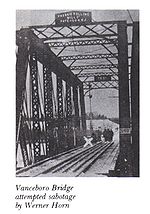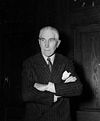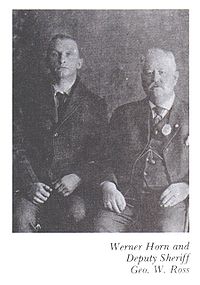
Vanceboro international bridge bombing
Encyclopedia

Saint Croix-Vanceboro Railway Bridge
The Saint Croix-Vanceboro Railway Bridge is a long railway bridge crossing the St. Croix River from St. Croix, New Brunswick, Canada to Vanceboro, Maine, United States. A deck truss design, it is owned and operated by the New Brunswick Southern Railway....
on February 2, 1915.
This international bridge crossed the St. Croix River between St. Croix, New Brunswick, Canada
Canada
Canada is a North American country consisting of ten provinces and three territories. Located in the northern part of the continent, it extends from the Atlantic Ocean in the east to the Pacific Ocean in the west, and northward into the Arctic Ocean...
and Vanceboro
Vanceboro, Maine
Vanceboro is a town in Washington County, Maine, United States. The town was named after landowner William Vance. The town is located at the eastern terminus of Maine State Route 6. Vanceboro is across the St. Croix River from St. Croix, New Brunswick, Canada, to which it is connected by the Saint...
, Maine, United States. At the time of the sabotage attempt in 1915, the bridge was jointly owned and operated by the Canadian Pacific Railway
Canadian Pacific Railway
The Canadian Pacific Railway , formerly also known as CP Rail between 1968 and 1996, is a historic Canadian Class I railway founded in 1881 and now operated by Canadian Pacific Railway Limited, which began operations as legal owner in a corporate restructuring in 2001...
(on the Canadian side) and the Maine Central Railroad
Maine Central Railroad
The Maine Central Railroad Company was a railroad in central and southern Maine. It was chartered in 1856 and began operations in 1862. It operated a mainline between South Portland, Maine, east to the Canada-U.S...
(on the American side).
The bombing was masterminded by then spymaster Franz von Papen
Franz von Papen
Lieutenant-Colonel Franz Joseph Hermann Michael Maria von Papen zu Köningen was a German nobleman, Roman Catholic monarchist politician, General Staff officer, and diplomat, who served as Chancellor of Germany in 1932 and as Vice-Chancellor under Adolf Hitler in 1933–1934...
and executed by Werner Horn. The bomb failed to destroy the bridge but did make it unsafe to use until minor repairs were done. The explosion did however blow out windows in nearby buildings.
Background

Neutral country
A neutral power in a particular war is a sovereign state which declares itself to be neutral towards the belligerents. A non-belligerent state does not need to be neutral. The rights and duties of a neutral power are defined in Sections 5 and 13 of the Hague Convention of 1907...
in World War I. The Canadian Pacific Railway was prohibited to carry any war goods or troops onto or through United States territory. However, after Japan entered the war in 1914 on behalf of its British ally, Germany feared that Japan may send troops across the Pacific Ocean and through Canada
Canada
Canada is a North American country consisting of ten provinces and three territories. Located in the northern part of the continent, it extends from the Atlantic Ocean in the east to the Pacific Ocean in the west, and northward into the Arctic Ocean...
. Germany was convinced this would occur and ordered that Canadian railways be interrupted.
At the outbreak of World War I, Werner Horn was a German reserve army lieutenant who had been in Moka, Guatemala as the manager of a coffee plantation. Upon learning of the war he departed the plantation looking to return to Germany. From Moka he proceeded to Belize
Belize
Belize is a constitutional monarchy and the northernmost country in Central America. Belize has a diverse society, comprising many cultures and languages. Even though Kriol and Spanish are spoken among the population, Belize is the only country in Central America where English is the official...
, from there he sailed to Galveston and onwards to New York City. However he was unable to depart due to the British blockade in the North Sea
North Sea
In the southwest, beyond the Straits of Dover, the North Sea becomes the English Channel connecting to the Atlantic Ocean. In the east, it connects to the Baltic Sea via the Skagerrak and Kattegat, narrow straits that separate Denmark from Norway and Sweden respectively...
. After attempting to set sail for over a month he travelled to Mexico City to return to the plantation. While there he learned that another man had taken his job. He found a job at another plantation in Salto de Agua
Salto de Agua
Salto de Agua is a town and one of the 119 Municipalities of Chiapas, in southern Mexico.As of 2005, the municipality had a total population of 49,300. It covers an area of 1289.2 km²....
, Chiapas
Chiapas
Chiapas officially Estado Libre y Soberano de Chiapas is one of the 31 states that, with the Federal District, comprise the 32 Federal Entities of Mexico. It is divided in 118 municipalities and its capital city is Tuxtla Gutierrez. Other important cites in Chiapas include San Cristóbal de las...
. Before he could leave he received word in the form of a card telling him once again to return to Germany.
On December 26, 1914, Horn travelled to New Orleans and from there returned to New York where he stayed in the Arietta Hotel. While in New York he met the military attaché of the German Embassy in Washington D.C., Von Papen. Von Papen who was seeking saboteurs to sabotage Canadian railways thought that Horn, who was eager to serve the fatherland, was an ideal candidate. Von Papen went on to explain to the zealful Horn that the bombing would be seen as an act of courage and valour in Germany and that no one would be killed in the process. However the bridge was heavily used at the time and the chance of a train being caught in the bomb was high. Horn was paid $700 to destroy the St. Croix-Vanceboro railway bridge.
Bombing
Horn left New York from Grand Central Station on a New Haven RailroadNew York, New Haven and Hartford Railroad
The New York, New Haven and Hartford Railroad , was a railroad that operated in the northeast United States from 1872 to 1968 which served the states of Connecticut, New York, Rhode Island, and Massachusetts...
passenger train to Boston on January 29, 1915, carrying a suitcase of dynamite. He took the overnight train out of Boston (operated by the Boston and Maine Railroad
Boston and Maine Railroad
The Boston and Maine Corporation , known as the Boston and Maine Railroad until 1964, was the dominant railroad of the northern New England region of the United States for a century...
), placing the suitcase of explosives in a lower berth. Horn's sleeping car was transferred to the Maine Central Railroad
Maine Central Railroad
The Maine Central Railroad Company was a railroad in central and southern Maine. It was chartered in 1856 and began operations in 1862. It operated a mainline between South Portland, Maine, east to the Canada-U.S...
in Portland
Portland, Maine
Portland is the largest city in Maine and is the county seat of Cumberland County. The 2010 city population was 66,194, growing 3 percent since the census of 2000...
and proceeded east across Maine to the Maine Central's eastern terminus at the border hamlet of Vanceboro the following day. Upon arrival in Vanceboro, Horn checked into the Exchange Hotel and was observed hiding the suitcase of explosives in a wood pile outdoors while scouting out the railway bridge on the border over the St. Croix River several hundred feet to the east; this bridge was jointly owned by the Canadian Pacific Railway and the Maine Central Railroad. At least three Vanceboro residents reported his suspicious behaviour to the U.S. immigration inspector. The inspector interviewed Horn at the hotel and Horn assured him that he was merely a Danish
Denmark
Denmark is a Scandinavian country in Northern Europe. The countries of Denmark and Greenland, as well as the Faroe Islands, constitute the Kingdom of Denmark . It is the southernmost of the Nordic countries, southwest of Sweden and south of Norway, and bordered to the south by Germany. Denmark...
farmer looking to purchase land in the area. Horn spent the next two days maintaining a low profile and watching the extremely busy Canadian Pacific Railway main line in order to determine the schedule of trains.
On the night of Monday, February 1, 1915, Horn checked out of the hotel claiming to be catching a train that evening. He apparently changed into a German army uniform, to avoid being convicted of being a spy and executed, before proceeding to the railway bridge over the St. Croix River sometime after midnight.
Horn proceeded to position a suitcase filled with explosives on the Canadian side of the bridge but was interrupted by an oncoming train and was forced to move out of its path. After he was sure it had passed he proceeded to reposition the explosives. However he was interrupted a second time by another train. Puzzled and not wanting to kill anyone, he waited until 1:07 a.m. on February 2 before again repositioning the bomb on a girder. Horn cut the fuse, this changed the time before the explosion from fifty minutes to only three. Horn lit the fuse with a cigar and somehow made it back to the Exchange Hotel through a gale in −30 °F temperature before the dynamite exploded. At 1:10 a.m. on Tuesday, February 2, 1915 the bomb exploded, blowing out windows across Vanceboro and St. Croix and exposing residents to the freezing air outside. Some iron beams on the bridge were twisted or bent but the damage was relatively minor.

Railway officials inspected the bridge the following morning and discovered the damage was relatively minor, resulting in the bridge being out of service for several days.
Arrest and imprisonment
The sheriffSheriff
A sheriff is in principle a legal official with responsibility for a county. In practice, the specific combination of legal, political, and ceremonial duties of a sheriff varies greatly from country to country....
for Vanceboro, along with two Canadian police officers from McAdam
McAdam, New Brunswick
McAdam is a village located in the southwestern corner of York County, New Brunswick, Canada. The village covers and has a population of 1,404 as of 2006.The area was first settled in the mid-to-late 19th century as a group of small lumber camps...
, New Brunswick who crossed the border to provide assistance, detained Horn at the hotel and he surrendered to American authorities. Since the bomb exploded on the Canadian (St. Croix, New Brunswick) side of the bridge, the only charge that the United States could initially lay against Horn in order to detain him was a mischief charge for breaking windows in Vanceboro.
Horn was moved soon thereafter to a jail in Machias for his safety (Vanceboro residents were upset with him over the damage he had caused them) while Canadian authorities began the process of seeking his extradition
Extradition
Extradition is the official process whereby one nation or state surrenders a suspected or convicted criminal to another nation or state. Between nation states, extradition is regulated by treaties...
. Horn was interrogated by the Federal Bureau of Investigation
Federal Bureau of Investigation
The Federal Bureau of Investigation is an agency of the United States Department of Justice that serves as both a federal criminal investigative body and an internal intelligence agency . The FBI has investigative jurisdiction over violations of more than 200 categories of federal crime...
for several days and signed a confession with an agreed-upon statement of facts where he revealed the details of his crime.
Horn faced a federal grand jury in Boston, Massachusetts at the United States District Court for the District of Massachusetts
United States District Court for the District of Massachusetts
The United States District Court for the District of Massachusetts is the federal district court whose jurisdiction is the Commonwealth of Massachusetts, USA. The first court session was held in Boston in 1789. The second term was held in Salem in 1790 and until 1813 court session locations...
and was indicted on March 2, 1915 for his most serious crime while in the United States - a charge of transporting explosives on a common carrier that also transported passengers for hire. He was sentenced to serve 18 months at the Atlanta Federal Penitentiary
United States Penitentiary, Atlanta
United States Penitentiary, Atlanta is a medium-security federal prison for men in Atlanta, Georgia. It also has a detention center for pre-trial and holdover inmates and an adjacent camp for minimum security male inmates...
, Atlanta, Georgia
Georgia (U.S. state)
Georgia is a state located in the southeastern United States. It was established in 1732, the last of the original Thirteen Colonies. The state is named after King George II of Great Britain. Georgia was the fourth state to ratify the United States Constitution, on January 2, 1788...
.
After serving his sentence, Horn was extradited to Canada in October 1919 and was tried in the Court of Queen's Bench of New Brunswick
Court of Queen's Bench of New Brunswick
The Court of Queen's Bench of New Brunswick is the superior court of the Canadian province of New Brunswick.- Structure :...
in Fredericton, New Brunswick
Fredericton, New Brunswick
Fredericton is the capital of the Canadian province of New Brunswick, by virtue of the provincial parliament which sits there. An important cultural, artistic, and educational centre for the province, Fredericton is home to two universities and cultural institutions such as the Beaverbrook Art...
. He was found guilty and sentenced to serve 10 years at Dorchester Penitentiary
Dorchester Penitentiary
The Dorchester Penitentiary is a Canadian federal corrections facility located in the village of Dorchester, New Brunswick....
, Dorchester, New Brunswick
Dorchester, New Brunswick
Dorchester is a Canadian village and shire town in Westmorland County, New Brunswick.It is located on the eastern side of the mouth of the lush Memramcook River valley near the river's discharge point into Shepody Bay...
. Horn was assessed by Canadian prison authorities to be insane in July 1921 whereby he was released and deported to Germany.

